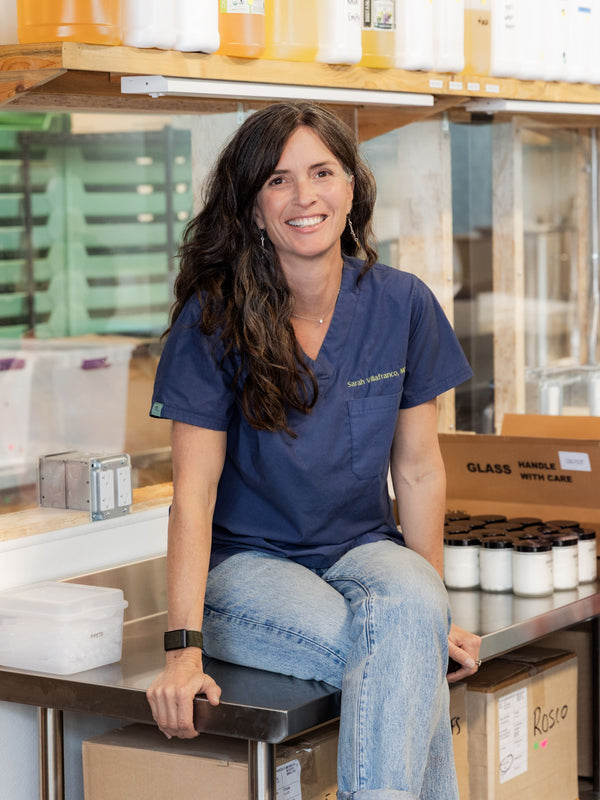I wrote this guide because we get a huge number of questions on this topic, and there is no definitive set of guidelines on the subject. There are a few good resources, but the information can be contradictory: one person says clary sage is no problem, another says avoid it at all costs. A practitioner with Traditional Chinese Medicine training avoids evergreen oils in pregnancy, while a traditionally trained aromatherapist uses them to increase energy and stamina. In addition, you probably have friends and coworkers who are using or selling essential oils from multilevel marketing companies. In short, a pregnant person can end up pretty confused about the bottom line.
Can I Use Essential Oils During Pregnancy?
The short answer? Yes! As a western-trained physician and CEO of a natural skincare company, I’ve looked at the data, read the studies, and sought the opinions of expert aromatherapists. Below is my common sense guide to using essential oils in pregnancy that synthesizes all this great information while keeping a connection to evidence-based medicine. The chart below lists essential oils by category, to help you decide which oils, if any, you feel comfortable using. If you’re an aromatherapist, or working with one, you should feel free to explore the boundaries of this guide. But, if you just need some safe guidelines for using essential oils in pregnancy, here they are!
How to Use Essential Oils During Pregnancy
- Internal essential oils should be avoided during pregnancy because taking essential oils by mouth results in the greatest exposure to the developing baby. If you plan to use essential oils orally, you must do so under the guidance of a trained expert. They are potent medicines, and even beautiful, fragrant plants can be toxic!
- Using undiluted essential oils on the skin during pregnancy (and most other times) is not safe for many essential oils. Generally, I do not recommend undiluted topical application during pregnancy.
- Other methods of essential oil use include baths, inhalation, wash-off products, and leave-on products. This will come down to personal choice, but the safest plan is one you've heard before: everything in moderation! Use appropriate essential oils (see chart) moderately and in low concentrations.
- Keep in mind that your skin and your nose can be much more sensitive during pregnancy, so less is more. It's a time of many fluctuations, and skin troubles are (unfortunately) not uncommon. Of note, phototoxicity is more common in pregnancy, so I’ve included a section in the chart about phototoxic oils.
- If you find that your skin is super sensitive or reactive during pregnancy, stick to unscented products, like those in this collection.
- Lastly, and very importantly, remember that just because you used an essential oil in pregnancy does not mean it's safe for your newborn baby! Babies have sensitive skin, developing systems, and immature immune function, so most essential oils are too potent for babies under one year of age. I recommend using unscented products on babies under one, and then incorporating appropriate oils in moderation, with the guidance of an accredited aromatherapist.

This chart above is based on several factors. First, I reviewed the scientific information available online, including guidelines from the International Federation of Professional Aromatherapists (IFPA) and the National Association for Holistic Aromatherapy (NAHA). Then, I reached out to several nationally known aromatherapists** and had them review this chart, incorporating most of their suggestions. If you want to dig deeper on the available data, check out Essential Oil Safety by Robert Tisserand.
Above all, remember that most essential oils (except those in the first section of the table below) are safe in pregnancy when used in low dilutions, like a couple drops in a bath, a diffuser, or a massage oil. There are zero studies showing evidence of birth defects or miscarriages due to "normal use" of appropriate essential oils. Using large, undiluted quantities of any essential oils, either internally or on the skin, is a bad idea during pregnancy—and all other times!
**Very special thanks to Robert Tisserand, Hope Gillerman, and Amy Galper for their expertise and guidance. Though I may not please them all with my compilation of their opinions, I am fairly certain none will gasp in horror, and I am very certain this chart provides safe guidelines for expectant mothers.
If you have questions, please email us anytime at help@osmiaskincare.com—we're here to help!
With love and wishes for a relaxed, healthy pregnancy,

** Disclaimer: Aromatherapy in pregnancy is a personal choice. We do not recommend the use of oral or undiluted essential oils during pregnancy unless working directly with an aromatherapist. We do think that moderate use of diluted, appropriate essential oils can contribute to a healthy, happy pregnancy.









